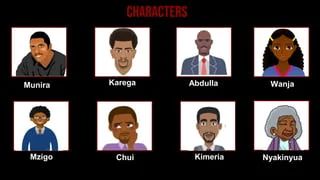Welcome to my Blog,
This blog is part of our study. This Thinking activity is based on Petals of Blood by Ngugi Wa Thiong’o By Ngugi Wa Thiong’o. It was assigned by Megha Ma’am Department of English MKBU.
Introduction of Author
Ngugi Wa Thiong’o
Ngugi wa Thiong'o, born in 1938 in Kamiriithu, Kenya, stands as a towering figure in African literature and activism, renowned for his profound exploration of the impact of colonialism on African societies and his unwavering commitment to the preservation of African languages and cultures. Central to Ngugi's literary oeuvre are his novels, plays, and essays, which serve as poignant reflections on the complexities of post-colonial African identity. Through works like "Weep Not, Child," "A Grain of Wheat," "Petals of Blood," and "Wizard of the Crow," Ngugi delves into the struggles, aspirations, and resilience of African peoples in the face of historical injustices and socio-political upheavals. His narratives offer incisive critiques of colonial oppression while foregrounding the agency and dignity of African individuals and communities.
A defining moment in Ngugi's career came in the 1970s when he made the bold decision to renounce writing in English, the language of the colonizer, and instead embrace his native Gikuyu tongue. This radical shift marked a symbolic act of resistance against colonial linguistic imperialism and a reaffirmation of the value of indigenous languages in shaping African cultural identity. Ngugi's advocacy for writing in African languages was groundbreaking, inspiring a generation of African writers to reclaim their linguistic heritage and challenge the hegemony of Western literary norms.
Beyond his literary endeavors, Ngugi's activism extends to his role as a vocal advocate for decolonization and social justice. He has used his platform to raise awareness about the enduring legacies of colonialism and imperialism in Africa, calling for a reclamation of African history, traditions, and knowledge systems. Through his scholarship and public engagements, Ngugi has been instrumental in fostering a greater appreciation for African literature and cultures on the global stage.
Ngugi's contributions to African literature have not gone unnoticed, earning him numerous accolades and honors, including the Lotus Prize for Literature and the Nonino International Prize. His nomination for the Man Booker International Prize further solidifies his status as a literary luminary of international acclaim. As a teacher and mentor, Ngugi has played a pivotal role in shaping the next generation of African writers and intellectuals, instilling in them a sense of pride in their heritage and a commitment to social change. His legacy continues to inspire countless individuals across the African continent and beyond, underscoring the enduring relevance of his message of cultural revival and liberation. Ngugi wa Thiong'o's legacy is one of artistic excellence, intellectual courage, and unwavering advocacy for African self-determination. Through his literary works and activism, he has left an indelible mark on the landscape of African literature, challenging conventions, and championing the voices of the marginalized. As Africa navigates the complexities of the 21st century, Ngugi's vision of cultural empowerment and social justice remains as pertinent as ever, serving as a guiding light for generations to come.
Works:
- "Weep Not, Child" (1964)
- "The River Between" (1965)
- "A Grain of Wheat" (1967)
- "Devil on the Cross" (1980)
- "Matigari" (1986)
- "Dreams in a Time of War: A Childhood Memoir" (2010)
Introduction of Novel
Petals of Blood
Petals of Blood is set in the fictional Kenyan town of Ilmorog in the late 1970s. It follows the lives of four primary characters - Munira the teacher, Abdulla the brothel owner, Wanja the prostitute, and Karega the activist. The novel opens by revealing that Munira has been arrested for setting fire to a brothel, killing three prominent businessmen - Chui, Mzigo, and Kimeria. The rest of the story is told in a series of flashbacks and shifts in perspective. Twelve years earlier, Munira arrived in Ilmorog as the new teacher. He befriends Abdulla, who owns a local bar, and Wanja, who has returned to live with her grandmother after being impregnated as a teen. Wanja gets a job at Abdulla's bar to pay for local boy Joseph's education at Munira's urging. Munira's old schoolmate Karega, the son of his father's former worker, also comes to Ilmorog after being expelled from the school they attended for protesting the colonial curriculum. Karega was in love with Munira's sister Mukami, but she committed suicide after their families clashed over diverging views during Kenyan independence.
Wanja reveals she had worked as a prostitute in Nairobi after leaving home, surviving abuse from clients like the wealthy Kimeria, who had impregnated her as a teen. She starts an affair with both Munira and Karega. The four main characters' lives intertwine as Kenya transitions to independence but economic exploitation continues. Wanja and Abdulla start a successful brewery making the traditional Theng'eta drink but are forced to sell it to Mzigo due to predatory government loans. Wanja then opens a brothel, intending to seek revenge on the wealthy businessmen by taking their money. Karega becomes a labor activist at the Theng'eta brewery until he's fired for his political writings calling for workers' rights.
On the fateful night, Munira - now a born-again Christian - believes he is called to set the brothel on fire to save Karega from Wanja's "sinful" ways, inadvertently killing the businessmen inside. Through depicting the characters' lives before and after this event, the novel serves as an allegory for the Kenyan people's hopes, struggles, and disillusionment amid economic inequality and neo-colonialism in the post-independence era.
Characters
Godfrey Munira
Abdulla
Chui
1) Write a detailed note on history, sexuality, and gender in Ngugi’s Petals of Blood.
History:
Petals of Blood is steeped in Kenya's colonial and postcolonial history. The narrative takes place in the years after Kenyan independence, but through flashbacks and character backstories, Ngugi traces how the characters were shaped by the struggle against British rule.
Characters like Karega's brother Nding'uri and Abdulla were part of the Mau Mau revolutionary movement, paying heavy prices like imprisonment and execution at the hands of the colonial regime. This history informs the postcolonial disillusionment as economic exploitation persists after independence under new Kenyan leadership.
Munira's fraught relationship with his former teacher Chui also symbolizes the continuity of neocolonialism through the persistence of Eurocentric educational models after the end of direct British rule. The shifting perspectives allow Ngugi to critique both colonial and neocolonial policy and power structures.
Sexuality:
Sexuality is a powerful force shaping the lives of multiple characters in divergent ways. For Wanja, her sexuality is a means of potential liberation but is also a source of repeated exploitation, first by the wealthy businessman Kimeria who impregnates her as a teen, and later by abusive clients when she turns to prostitution in Nairobi.
Her affairs with both Munira and Karega represent attempts to reclaim her sexuality on her own terms, but she remains trapped in cycles of oppression even after opening her own brothel business. Munira's twisted view of Wanja's sexuality as a "sinful" force to be extinguished leads him to commit the arson attack.
Gender:
Issues of gender are integral, with female characters like Wanja and Munira's sister Mukami facing immense societal constraints and repression in the male-dominated Kenyan society depicted. Wanja is judged harshly as a prostitute despite the lack of options afforded to her as an uneducated woman.
Mukami's tragic suicide after being forced to choose between her lover Karega and her family highlights the rigid gender roles and the inability of women to assert independence. Male activists like Karega and Abdulla remain limited in their ability to fully understand and dismantle patriarchal structures.
However, female characters like the elderly Nyakinyua also represent repositories of subversive feminine power and Kenyan tradition outside oppressive colonial and neocolonial frameworks. Ngugi deftly interweaves these themes of history, sexuality, and gender to paint a powerful portrait of the Kenyan nation's journey and the people's unified yet fragmented struggle for true liberation across multiple dimensions of identity, power, and freedom.
2. “Petals of Blood begins from the premise that dwelling is best articulated as a desire for peace and oneness with the earth, if not the all of the fourfold.” Explain.
Ngugi wa Thiong'o's novel Petals of Blood is fundamentally rooted in an ecocritical philosophy that situates humanity's ability to find peace and authentic "dwelling" as contingent on restoring a holistic, harmonious relationship with the earth and the broader cosmos. The narrative serves as an incisive interrogation of how colonial capitalism has violently sundered this traditional oneness, creating the conditions of dispossession, exploitation, and disharmony that afflict the Kenyan people.
Central to this vision is the novel's depiction of indigenous Kenyan traditions and wisdom around the deep spiritual and material reverence for the land itself. Characters like Wanja's grandmother Nyakinyua embody a way of being inextricably intertwined with the cycles of the soil - her forced displacement from her ancestral land represents the violent uprooting of this profound connection by the neo-colonial order. The ritualistic brewing and communal consumption of the Theng'eta drink also highlight these pre-colonial practices emphasizing reciprocity between humans and the earth.
Ngugi contrasts this ancestral "dwelling" with the capitalist logics introduced under colonial rule that treat the land merely as an inert commodity to be relentlessly extracted and drained for surplus accumulation by forces like the wealthy businessmen Kimeria and Mzigo. Their comprador capitalist activities, often in collusion with foreign imperial interests, reduce the holistic Kenyan earth to parcels to be speculated on, enclosed, and ruthlessly expropriated from the people in pursuit of profit. This process, Ngugi suggests, is the root breach that has severed the "oneness with the earth" and disturbed the harmonious "fourfold" that encompasses the mortal, terrestrial, cosmic, and divine dimensions.
Throughout the novel, the Kenyan people's collective trauma, alienation, and inability to find true peace in the neo-colonial present is directly traced back to this primal capitalist disruption of their symbiotic relationship with the land, their topographies of sustenance and belonging. Characters like the activist Karega articulate the necessity of not just political liberation, but a deeper "revolution" - a spiritual, economic, and cultural revolution to regain self-possessed sovereignty rooted in the earth and a revitalized cosmological "fourfold."
Only by restoring the Kenyan people as the rightful indwellers of their soil, stewards of their own labor and resources, and faithful adherents to ancestral ecocentric traditions can the collective re-weave the interconnected dimensions of the fourfold and arrive at true peace, justice, and harmonious dwelling. Petals of Blood emerges as a powerful, enduring call to simultaneously decolonize the land and the mind in order to re-cultivate humanity's rightful, undamaged ecology of existential belonging to the earth and the cosmos.
Word Count - 1785
Thank You for Reading and Visiting...







No comments:
Post a Comment